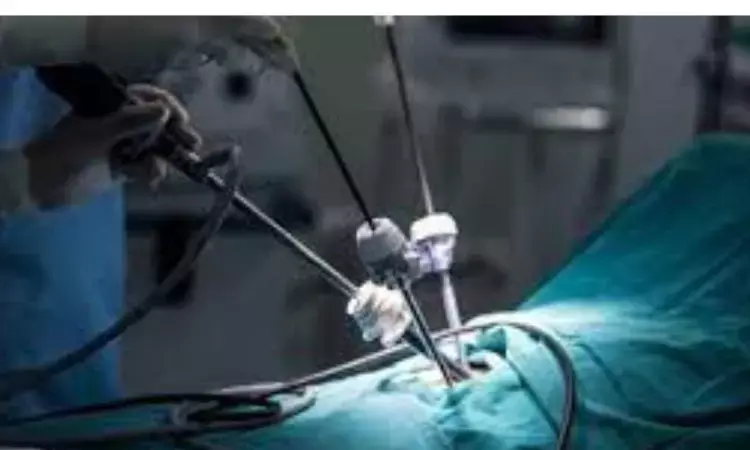- Home
- Medical news & Guidelines
- Anesthesiology
- Cardiology and CTVS
- Critical Care
- Dentistry
- Dermatology
- Diabetes and Endocrinology
- ENT
- Gastroenterology
- Medicine
- Nephrology
- Neurology
- Obstretics-Gynaecology
- Oncology
- Ophthalmology
- Orthopaedics
- Pediatrics-Neonatology
- Psychiatry
- Pulmonology
- Radiology
- Surgery
- Urology
- Laboratory Medicine
- Diet
- Nursing
- Paramedical
- Physiotherapy
- Health news
- Fact Check
- Bone Health Fact Check
- Brain Health Fact Check
- Cancer Related Fact Check
- Child Care Fact Check
- Dental and oral health fact check
- Diabetes and metabolic health fact check
- Diet and Nutrition Fact Check
- Eye and ENT Care Fact Check
- Fitness fact check
- Gut health fact check
- Heart health fact check
- Kidney health fact check
- Medical education fact check
- Men's health fact check
- Respiratory fact check
- Skin and hair care fact check
- Vaccine and Immunization fact check
- Women's health fact check
- AYUSH
- State News
- Andaman and Nicobar Islands
- Andhra Pradesh
- Arunachal Pradesh
- Assam
- Bihar
- Chandigarh
- Chattisgarh
- Dadra and Nagar Haveli
- Daman and Diu
- Delhi
- Goa
- Gujarat
- Haryana
- Himachal Pradesh
- Jammu & Kashmir
- Jharkhand
- Karnataka
- Kerala
- Ladakh
- Lakshadweep
- Madhya Pradesh
- Maharashtra
- Manipur
- Meghalaya
- Mizoram
- Nagaland
- Odisha
- Puducherry
- Punjab
- Rajasthan
- Sikkim
- Tamil Nadu
- Telangana
- Tripura
- Uttar Pradesh
- Uttrakhand
- West Bengal
- Medical Education
- Industry
Is contralateral orchiopexy safe at the time of urgent scrotal exploration?

France: A recent study in the Journal of Urology has questioned the dogma of routine contralateral fixation in patients with testicular torsion. According to the study, doing so increases the risk of associated minor postoperative complications (Clavien-Dindo 2) but does not result in a testicular loss (Clavien-Dindo 2). Immediate contralateral orchiopexy (ICLO) was linked to an increased postoperative complication rate, including hematoma and delayed wound healing.
The primary goal of Igor Duquesne and colleagues was to assess the safety of instant contralateral orchiopexy (ICLO) during scrotal examination for testicular torsion suspicion.
Patient data were obtained from the TORSAFUF cohort project, a multicenter nationwide research undertaken between 2005 and 2019 at 14 academic French institutions. Each patient who had surgical exploration for testicular torsion suspicion was included in the study. The major study goal was to evaluate the safety of ICLO to ipsilateral scrotal exploration alone. The complication rate within 90 days of surgery was the major outcome of interest. Before collecting data, the end point was determined.
ICLO was linked with a higher risk of any complication, with hematoma (3 % versus 1%) and delayed wound healing being the most common (7 % vs 2 %). At a median of 3 to 4 years of follow-up, 7% of patients in both groups had chronic orchalgia, and the risk of future contralateral torsion was comparable, at 0.7 % for ICLO vs 0.3 % without ICLO. However, longer-term monitoring may be necessary to identify the hazards of ICLO performance (or omission).
With the results going against the ICLO intervention and no other strong evidence that suggest otherwise, the authors have concluded to go for the conventional method of treatment of testicular torsion instead of opting for ICLO.
Reference:
Duquesne, I., Pinar, U., Dang, V. T., Mauger de Varennes, A., Benali, N. A., Berchiche, W., Margue, G., Gaillard, C., Bardet, F., Hulin, M., Manuguerra, A., Plassais, C., Wandoren, W., Lannes, F., Khene, Z.-E., & Pradere, B. (2021). Contralateral Orchiopexy at the Time of Urgent Scrotal Exploration—Is It Safe? A Propensity Score Matched Analysis from the TORSAFUF Cohort. Journal of Urology. https://doi.org/10.1097/ju.0000000000002142
Medical Dialogues consists of a team of passionate medical/scientific writers, led by doctors and healthcare researchers. Our team efforts to bring you updated and timely news about the important happenings of the medical and healthcare sector. Our editorial team can be reached at editorial@medicaldialogues.in.
Dr Kamal Kant Kohli-MBBS, DTCD- a chest specialist with more than 30 years of practice and a flair for writing clinical articles, Dr Kamal Kant Kohli joined Medical Dialogues as a Chief Editor of Medical News. Besides writing articles, as an editor, he proofreads and verifies all the medical content published on Medical Dialogues including those coming from journals, studies,medical conferences,guidelines etc. Email: drkohli@medicaldialogues.in. Contact no. 011-43720751


